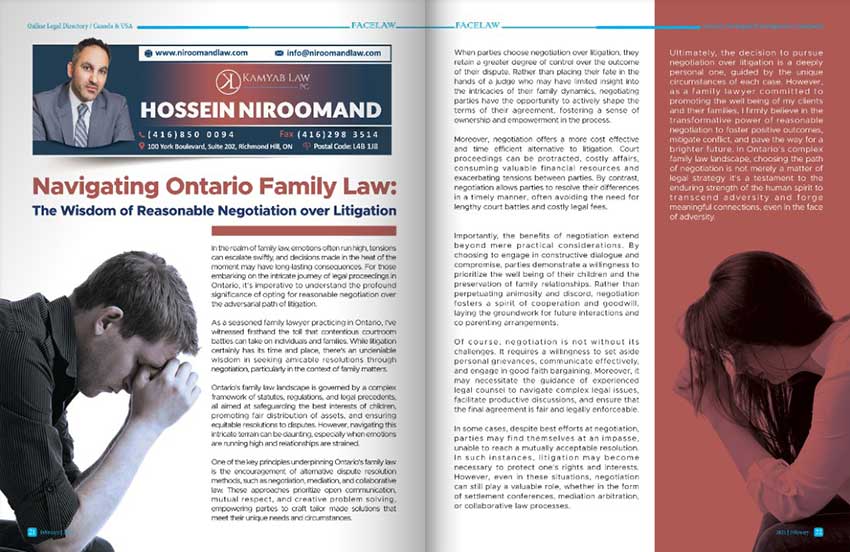Navigating Ontario Family Law

Navigating Ontario Family Law
Navigating Ontario Family Law: The Wisdom of Reasonable Negotiation over Litigation
In the realm of family law, emotions often run high, tensions can escalate swiftly, and decisions made in the heat of the moment may have long-lasting consequences. For those embarking on the intricate journey of legal proceedings in Ontario, it's imperative to understand the profound significance of opting for reasonable negotiation over the adversarial path of litigation.
As a seasoned family lawyer practicing in Ontario, I've witnessed firsthand the toll that contentious courtroom battles can take on individuals and families. While litigation certainly has its time and place, there's an undeniable wisdom in seeking amicable resolutions through negotiation, particularly in the context of family matters.
Ontario's family law landscape is governed by a complex framework of statutes, regulations, and legal precedents, all aimed at safeguarding the best interests of children, promoting fair distribution of assets, and ensuring equitable resolutions to disputes. However, navigating this intricate terrain can be daunting, especially when emotions are running high and relationships are strained.
One of the key principles underpinning Ontario's family law is the encouragement of alternative dispute resolution methods, such as negotiation, mediation, and collaborative law. These approaches prioritize open communication, mutual respect, and creative problem-solving, empowering parties to craft tailor-made solutions that meet their unique needs and circumstances.
When parties choose negotiation over litigation, they retain a greater degree of control over the outcome of their dispute. Rather than placing their fate in the hands of a judge who may have limited insight into the intricacies of their family dynamics, negotiating parties have the opportunity to actively shape the terms of their agreement, fostering a sense of ownership and empowerment in the process.
Moreover, negotiation offers a more cost-effective and time-efficient alternative to litigation. Court proceedings can be protracted, costly affairs, consuming valuable financial resources and exacerbating tensions between parties. By contrast, negotiation allows parties to resolve their differences in a timely manner, often avoiding the need for lengthy court battles and costly legal fees.
Importantly, the benefits of negotiation extend beyond mere practical considerations. By choosing to engage in constructive dialogue and compromise, parties demonstrate a willingness to prioritize the well-being of their children and the preservation of family relationships. Rather than perpetuating animosity and discord, negotiation fosters a spirit of cooperation and goodwill, laying the groundwork for future interactions and co-parenting arrangements.
Of course, negotiation is not without its challenges. It requires a willingness to set aside personal grievances, communicate effectively, and engage in good-faith bargaining. Moreover, it may necessitate the guidance of experienced legal counsel to navigate complex legal issues, facilitate productive discussions, and ensure that the final agreement is fair and legally enforceable.
In some cases, despite best efforts at negotiation, parties may find themselves at an impasse, unable to reach a mutually acceptable resolution. In such instances, litigation may become necessary to protect one's rights and interests. However, even in these situations, negotiation can still play a valuable role, whether in the form of settlement conferences, mediation-arbitration, or collaborative law processes.
Ultimately, the decision to pursue negotiation over litigation is a deeply personal one, guided by the unique circumstances of each case. However, as a family lawyer committed to promoting the well-being of my clients and their families, I firmly believe in the transformative power of reasonable negotiation to foster positive outcomes, mitigate conflict, and pave the way for a brighter future. In Ontario's complex family law landscape, choosing the path of negotiation is not merely a matter of legal strategy—it's a testament to the enduring strength of the human spirit to transcend adversity and forge meaningful connections, even in the face of adversity.





